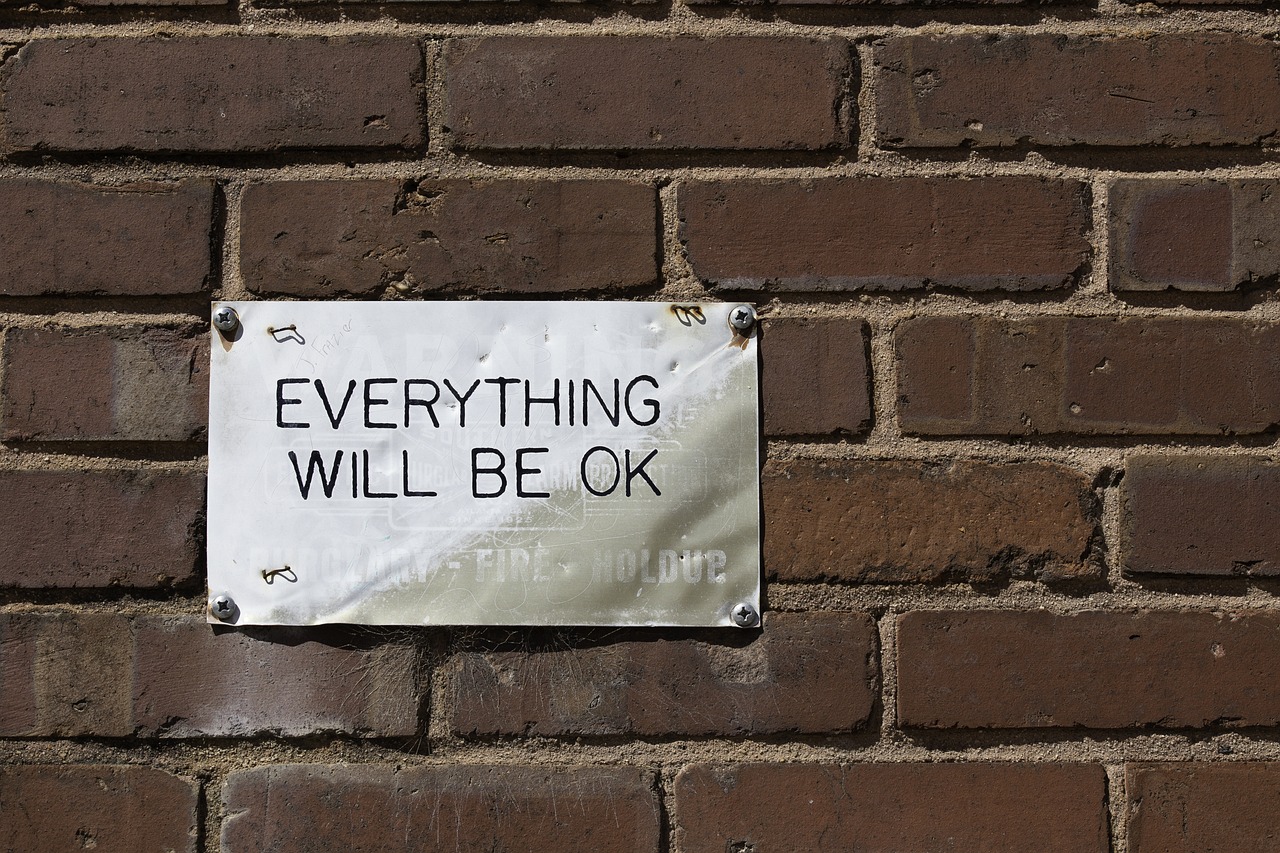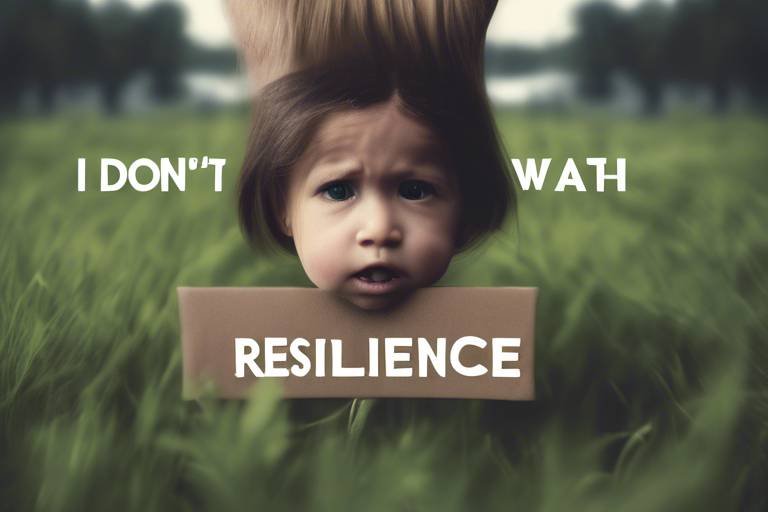Cultivating Resilience to Handle Workplace Pressure
In today's fast-paced work environment, the ability to handle stress and pressure is more important than ever. Workplace pressure can feel like a heavy weight on your shoulders, but cultivating resilience can help you lift that weight and keep moving forward. Imagine resilience as your personal superhero cape, allowing you to bounce back from challenges and setbacks. It’s not just about surviving; it’s about thriving even when the going gets tough. So, how do we build this incredible resilience? Let’s dive into some effective strategies and techniques that can empower you to manage stress while maintaining productivity and well-being.
Workplace pressure can stem from various sources, including tight deadlines, overwhelming workloads, and complex interpersonal dynamics. Recognizing these factors is crucial for developing strategies to cope and thrive under stress. Think of workplace pressure like a storm; it can be unpredictable and overwhelming, but with the right preparation, you can weather it effectively. By understanding what pressures exist in your work environment, you can better equip yourself to face them head-on.
Resilience is more than just a buzzword; it’s a vital skill that enables you to bounce back from setbacks and adapt to challenges. In a work environment, resilience helps individuals maintain focus, adapt to change, and ultimately achieve their professional goals despite obstacles. Imagine resilience as a rubber band; it stretches under pressure but always returns to its original shape. This elasticity allows you to navigate through the toughest situations without losing your core strength.
Understanding what specifically triggers stress in your work life is the first step in building resilience. By identifying personal stressors, you can develop targeted strategies to manage them effectively. Think of stressors as pesky weeds in a garden; if you don’t know what they are, they can quickly take over. Take the time to reflect and jot down what causes you the most stress—whether it’s a looming deadline or a difficult coworker. This awareness is essential for creating a personalized resilience plan.
Common stress triggers in the workplace include:
- Tight deadlines
- Unclear expectations
- Excessive workloads
Recognizing these triggers can help you prepare and respond more effectively when they arise. Just like a seasoned sailor knows how to navigate rough waters, understanding your stressors allows you to steer your ship with confidence.
Engaging in self-reflection techniques, such as journaling or mindfulness, can help you identify your stress triggers. These practices are like a mirror reflecting your inner thoughts and feelings, allowing you to gain clarity and insight. Take a few moments each day to jot down your experiences or meditate on your feelings. This awareness is essential for creating a personalized resilience plan that works for you.
A strong support network can significantly enhance resilience. Connecting with colleagues, mentors, or friends provides emotional support and practical advice during challenging times. Think of your support network as a safety net; it catches you when you stumble and helps you regain your footing. Don’t hesitate to reach out to those around you; sometimes, just talking about your challenges can lighten the load.
Effective coping strategies are vital for managing stress. These can include time management techniques, relaxation exercises, and healthy lifestyle choices that promote overall well-being. Just like a toolbox filled with various tools, having a range of coping strategies at your disposal allows you to tackle different challenges with ease.
Implementing effective time management techniques, such as prioritizing tasks and setting realistic deadlines, can help reduce feelings of overwhelm and improve productivity. Consider using tools like to-do lists or digital planners to keep track of your responsibilities. By organizing your tasks, you can create a clearer path through the chaos, making it easier to focus on what truly matters.
Incorporating relaxation exercises, such as deep breathing or meditation, into your daily routine can help alleviate stress and enhance your ability to cope with workplace pressures. Think of these exercises as a mini-vacation for your mind; they provide a much-needed break from the hustle and bustle of work. Even just a few minutes of focused breathing can do wonders for your stress levels.
Q1: What are some quick stress-relief techniques I can use at work?
A1: Simple techniques include deep breathing exercises, taking short walks, or practicing mindfulness for a few minutes. These can help clear your mind and reduce stress levels.
Q2: How can I effectively communicate my stress to my manager?
A2: Be honest and clear about your feelings. Prepare specific examples of what is causing your stress and suggest possible solutions or adjustments that could help.
Q3: Is it possible to build resilience over time?
A3: Absolutely! Resilience is a skill that can be developed through practice and experience. The more you confront challenges and learn from them, the stronger your resilience becomes.

Understanding Workplace Pressure
Workplace pressure is an all-too-familiar feeling for many of us, and it can arise from a variety of sources. Imagine juggling multiple tasks while racing against the clock; that’s the reality for countless individuals navigating their daily work lives. Deadlines, workload, and even the dynamics of interpersonal relationships can contribute to this pressure cooker environment. By recognizing these factors, you can start to develop effective strategies to cope and even thrive under stress.
Let’s break it down further. Deadlines can create a sense of urgency that may lead to anxiety. When you know that a project is due tomorrow, the pressure can feel overwhelming, almost like a ticking time bomb. On the other hand, having too much on your plate can lead to feelings of being stretched too thin. It’s like trying to fill a cup that’s already overflowing; eventually, something has to give. Additionally, interpersonal dynamics—such as conflicts with coworkers or unclear communication from management—can add layers of complexity to an already stressful situation.
What’s crucial here is understanding that workplace pressure is not just a personal struggle; it’s a common experience shared by many. According to a recent survey, about 80% of employees reported feeling stressed at work. So, how can we tackle this issue? By first acknowledging that workplace pressure is a reality and then taking proactive steps to manage it. This might include identifying specific stressors in your work environment, developing coping mechanisms, and fostering a supportive network around you.
In summary, understanding workplace pressure involves recognizing its sources and acknowledging its impact on our well-being and productivity. By doing so, you can start to build resilience, enabling you to handle stress more effectively. Remember, it’s not about eliminating pressure entirely; it’s about learning how to manage it in a way that allows you to maintain your focus and achieve your goals. So, what strategies can you adopt to transform pressure into a motivating force rather than a debilitating one?

Importance of Resilience
Resilience is not just a buzzword; it’s a vital skill that can make all the difference in how we navigate the ups and downs of our professional lives. Imagine standing in the middle of a storm, with winds howling and rain pouring down. That’s what workplace pressure can feel like at times. But what if you had the ability to not only withstand that storm but also to emerge from it stronger and more focused? This is the essence of resilience. It empowers individuals to bounce back from setbacks, adapt to challenges, and maintain their productivity and well-being even in the face of adversity.
In today’s fast-paced work environment, the ability to remain resilient is more crucial than ever. When you cultivate resilience, you’re essentially building a mental toolkit that allows you to handle stress effectively. This toolkit includes various strategies that can help you stay calm, focused, and productive. For instance, when faced with tight deadlines or unexpected challenges, a resilient individual is more likely to approach the situation with a positive mindset, seeking solutions rather than becoming overwhelmed.
Moreover, resilience fosters a sense of self-efficacy. This means that when you believe in your ability to overcome challenges, you’re more likely to take on new tasks and responsibilities with confidence. It's like riding a bicycle; the more you practice, the better you become. Similarly, the more you work on your resilience, the more adept you become at handling pressure, which ultimately leads to greater job satisfaction and career advancement.
To illustrate the importance of resilience, consider the following key benefits:
- Adaptability: Resilient individuals are more flexible in their thinking and can adjust to changes without losing their composure.
- Enhanced Problem-Solving Skills: They tend to approach problems with a solution-oriented mindset, making it easier to find effective resolutions.
- Improved Relationships: Resilience can lead to better interpersonal relationships, as resilient people often communicate more effectively and maintain a positive outlook.
- Long-Term Success: Ultimately, resilience contributes to sustained success in one’s career, as it allows individuals to persevere through challenges and emerge stronger.
In summary, resilience is a critical skill that not only helps individuals handle workplace pressure but also enhances their overall performance and satisfaction. By embracing resilience, you equip yourself with the tools needed to navigate life's challenges with grace and determination. So, the next time you find yourself in a high-pressure situation, remember that resilience is your secret weapon!
Q1: How can I develop resilience in the workplace?
A1: Developing resilience involves self-reflection, building a support network, and practicing stress management techniques. Engaging in mindfulness or journaling can also help identify personal stressors and coping strategies.
Q2: Can resilience be learned?
A2: Absolutely! Resilience is not an innate trait; it can be cultivated through practice and by adopting a positive mindset. The more you face challenges and learn from them, the more resilient you become.
Q3: What are some signs of low resilience?
A3: Signs of low resilience may include feeling overwhelmed by stress, difficulty adapting to change, and a tendency to give up easily when faced with challenges.
Q4: Why is resilience important for team dynamics?
A4: Resilience in teams fosters a collaborative environment where members support one another, share solutions, and maintain morale even during tough times. This collective resilience can lead to improved performance and innovation.

Identifying Personal Stressors
Understanding the specific factors that trigger stress in your work life is crucial for building resilience. Think of your stressors as the hidden monsters under your bed—until you shine a light on them, they seem overwhelming and scary. By identifying these personal stressors, you can develop targeted strategies to manage them effectively. This process begins with a bit of self-exploration and honesty.
Start by asking yourself some reflective questions. What situations make you feel anxious or overwhelmed? Is it the constant barrage of emails, the pressure of looming deadlines, or perhaps the dynamics of team interactions? Acknowledging these stressors is the first step toward conquering them. You might even consider keeping a stress diary for a week. Document when you feel stressed, what triggered it, and how you responded. Over time, patterns will emerge, revealing your unique stress triggers.
In addition to personal reflection, it can be beneficial to seek feedback from trusted colleagues or friends. Sometimes, an outside perspective can illuminate stressors you might not even be aware of. For instance, you may think that your workload is manageable, but a colleague might point out that you often take on more than your fair share. This kind of insight can be invaluable in understanding the full scope of your stressors.
Here are some common stress triggers to consider:
- Tight Deadlines: The pressure of completing tasks in a short time frame can lead to significant stress.
- Unclear Expectations: When you’re not sure what’s expected of you, it can create confusion and anxiety.
- Excessive Workloads: Taking on too much work can quickly lead to burnout.
Once you've identified your stressors, the next step is to develop a personalized resilience plan. This plan should focus on strategies tailored to your specific triggers. For example, if tight deadlines cause you stress, consider breaking tasks into smaller, manageable chunks and setting mini-deadlines for each. This approach not only makes the work feel less daunting but also provides a sense of accomplishment as you complete each segment.
In summary, identifying personal stressors is a fundamental step in cultivating resilience. By understanding what specifically triggers your stress, you can take proactive measures to manage it effectively. Remember, awareness is the first step toward empowerment. So, grab that metaphorical flashlight and start shining it on those hidden monsters—you might find they’re not as scary as they seem!

Common Stress Triggers
This article explores strategies and techniques to build resilience in the workplace, enabling individuals to effectively manage stress and pressure while maintaining productivity and well-being.
Workplace pressure can stem from various sources, including deadlines, workload, and interpersonal dynamics. Recognizing these factors is crucial for developing strategies to cope and thrive under stress.
Resilience is the ability to bounce back from setbacks. In a work environment, it helps individuals adapt to challenges, maintain focus, and ultimately achieve their professional goals despite obstacles.
Understanding what specifically triggers stress in your work life is the first step in building resilience. By identifying personal stressors, you can develop targeted strategies to manage them effectively.
In the hustle and bustle of modern work life, stress can often feel like an unwelcome companion. It's essential to recognize the common triggers that can lead to increased anxiety and pressure. Some of the most prevalent stressors include:
- Tight Deadlines: The ticking clock can create a sense of urgency that often leads to panic rather than productivity.
- Unclear Expectations: When you’re not sure what’s expected of you, it’s like trying to hit a moving target; frustration can quickly set in.
- Excessive Workloads: Taking on too much can feel like carrying a boulder uphill. The weight can become unbearable, leading to burnout.
Additionally, interpersonal dynamics can significantly affect workplace stress. Conflicts with colleagues or a lack of support from management can create a toxic environment, making it harder to focus and perform. Recognizing these triggers is the first step toward mitigating their effects. By being aware of what causes stress in your work life, you can prepare yourself to handle these situations more effectively.
Engaging in self-reflection techniques, such as journaling or mindfulness, can help you identify your stress triggers. This awareness is essential for creating a personalized resilience plan.
A strong support network can significantly enhance resilience. Connecting with colleagues, mentors, or friends provides emotional support and practical advice during challenging times.
Effective coping strategies are vital for managing stress. These can include time management techniques, relaxation exercises, and healthy lifestyle choices that promote overall well-being.
Implementing effective time management techniques, such as prioritizing tasks and setting realistic deadlines, can help reduce feelings of overwhelm and improve productivity.
Incorporating relaxation exercises, such as deep breathing or meditation, into your daily routine can help alleviate stress and enhance your ability to cope with workplace pressures.
- What are some quick ways to reduce workplace stress?
Taking short breaks, practicing deep breathing, and organizing your workspace can provide immediate relief from stress.
- How can I build my resilience over time?
Regular self-reflection, seeking feedback, and gradually exposing yourself to challenging situations can strengthen your resilience.
- Is it possible to eliminate stress entirely?
While it’s unrealistic to eliminate stress completely, learning how to manage it effectively can greatly improve your work life.

Self-Reflection Techniques
This article explores strategies and techniques to build resilience in the workplace, enabling individuals to effectively manage stress and pressure while maintaining productivity and well-being.
Workplace pressure can stem from various sources, including deadlines, workload, and interpersonal dynamics. Recognizing these factors is crucial for developing strategies to cope and thrive under stress.
Resilience is the ability to bounce back from setbacks. In a work environment, it helps individuals adapt to challenges, maintain focus, and ultimately achieve their professional goals despite obstacles.
Understanding what specifically triggers stress in your work life is the first step in building resilience. By identifying personal stressors, you can develop targeted strategies to manage them effectively.
Common stress triggers in the workplace include tight deadlines, unclear expectations, and excessive workloads. Recognizing these can help you prepare and respond more effectively when they arise.
Engaging in self-reflection techniques is like shining a flashlight into the darker corners of your mind, revealing stressors that may otherwise go unnoticed. One effective method is journaling, where you can pour your thoughts onto paper. This practice not only helps you articulate your feelings but also allows you to track patterns over time. For instance, you might notice that certain projects consistently raise your anxiety levels, which can inform your approach to similar tasks in the future.
Another powerful technique is mindfulness meditation. This practice encourages you to focus on the present moment, helping to quiet the mental chatter that often accompanies stress. By dedicating just a few minutes each day to mindfulness, you can cultivate a sense of calm that permeates your work life. Consider setting aside time in your schedule, perhaps during lunch or right after work, to engage in this practice. Over time, you may find that you’re better equipped to handle pressures as they arise.
Additionally, you can incorporate self-assessment questionnaires into your routine. These tools can help you evaluate your emotional responses to various situations and identify specific triggers. For example, you might ask yourself questions such as:
- What situations cause me the most stress?
- How do I typically react under pressure?
- What coping mechanisms have I used in the past, and how effective were they?
By reflecting on these questions, you can gain valuable insights into your stress responses and start developing a personalized resilience plan that works for you.
A strong support network can significantly enhance resilience. Connecting with colleagues, mentors, or friends provides emotional support and practical advice during challenging times.
Effective coping strategies are vital for managing stress. These can include time management techniques, relaxation exercises, and healthy lifestyle choices that promote overall well-being.
Implementing effective time management techniques, such as prioritizing tasks and setting realistic deadlines, can help reduce feelings of overwhelm and improve productivity.
Incorporating relaxation exercises, such as deep breathing or meditation, into your daily routine can help alleviate stress and enhance your ability to cope with workplace pressures.
Q1: What is resilience in the workplace?
A1: Resilience in the workplace refers to the ability to adapt to challenges, recover from setbacks, and maintain focus on professional goals despite stressors.
Q2: How can I identify my personal stressors?
A2: You can identify personal stressors through self-reflection techniques such as journaling, mindfulness meditation, and self-assessment questionnaires.
Q3: Why is a support network important?
A3: A support network provides emotional support and practical advice, helping you navigate challenges and enhance your resilience in stressful situations.
Q4: What are some effective coping strategies?
A4: Effective coping strategies include time management techniques, relaxation exercises, and maintaining a healthy lifestyle.

Building a Support Network
In the hustle and bustle of our daily work lives, it can often feel like we’re navigating a storm all on our own. However, is one of the most effective strategies for enhancing your resilience against workplace pressures. Think of your support network as a sturdy umbrella that shields you from the rain of stress and uncertainty. When you connect with colleagues, mentors, and friends, you create a safety net that not only provides emotional support but also practical advice during challenging times.
Why is having a support network so crucial? Well, just like a tree needs roots to stay upright during a storm, you need a strong foundation of support to help you weather the ups and downs of your job. When you share your experiences and challenges with others, you often discover that you’re not alone in your struggles. This sense of community can be incredibly reassuring and can help you maintain a positive outlook even when things get tough.
Moreover, a well-rounded support network can offer different perspectives and insights that you might not have considered. For instance, talking to a mentor might provide you with valuable career advice, while a close colleague might share coping strategies that have worked for them. By pooling your resources and experiences, you can develop a more comprehensive approach to handling workplace pressures.
Here are some key components to consider when building your support network:
- Colleagues: Engage with your coworkers; they can be a great source of support and camaraderie.
- Mentors: Seek out mentors who can guide you through career challenges and provide valuable insights.
- Friends and Family: Don’t underestimate the power of your personal relationships; they can offer emotional support and encouragement.
- Professional Groups: Join industry-specific groups or online forums to connect with like-minded professionals.
As you cultivate these relationships, it’s essential to remember that support is a two-way street. Be willing to offer help and encouragement to others in your network. This reciprocity not only strengthens your bonds but also fosters a culture of resilience within your workplace. When everyone is looking out for one another, it creates a more supportive and positive environment where everyone can thrive.
In conclusion, building a support network is not just about seeking help when you need it; it’s about creating a community that uplifts and empowers you. By investing time in nurturing these relationships, you equip yourself with the tools necessary to handle workplace pressure more effectively. So, reach out, connect, and watch how your resilience flourishes in the face of challenges!
What is a support network?
A support network is a group of individuals, such as colleagues, mentors, friends, and family, who provide emotional and practical support during challenging times.
How can I start building my support network?
Begin by reaching out to colleagues and expressing interest in building connections. Attend networking events or join professional groups to meet new people in your industry.
Why is it important to have a support network?
A support network helps you feel less isolated in your struggles, provides different perspectives, and offers encouragement and advice during stressful times.
How can I maintain my support network?
Regularly check in with your contacts, offer your assistance when needed, and participate in group activities to strengthen your relationships.

Developing Coping Strategies
When it comes to managing workplace pressure, developing effective coping strategies is not just a *nice-to-have*—it’s a necessity. Imagine standing at the edge of a cliff, the wind howling around you. Without a solid plan, you could easily be swept away. Similarly, in the workplace, having coping mechanisms in place can help you navigate through the storms of stress and emerge unscathed.
One of the most powerful tools in your arsenal is time management. Prioritizing tasks can feel like trying to juggle flaming torches; it’s tricky, but with practice, you can master it. Start by listing your tasks and categorizing them based on urgency and importance. This not only helps you focus on what truly matters but also reduces that overwhelming feeling of having too much on your plate. Here’s a simple table to illustrate how you might categorize your tasks:
| Task | Urgency | Importance |
|---|---|---|
| Project A Deadline | High | High |
| Team Meeting | Medium | High |
| Email Responses | Low | Medium |
Another crucial aspect of coping strategies is incorporating relaxation exercises into your daily routine. Think of these exercises as a safety net. When the pressure mounts, having techniques like deep breathing or meditation can help you regain your composure. For instance, taking just five minutes to practice deep breathing can lower your heart rate and clear your mind, allowing you to tackle challenges with renewed focus. You might be surprised at how much a few minutes of mindfulness can shift your perspective.
In addition to these techniques, maintaining a healthy lifestyle plays a vital role in your ability to cope with stress. Regular physical activity, a balanced diet, and adequate sleep are not just buzzwords; they form the foundation of resilience. When you feel physically well, your mind is clearer, and you're better equipped to handle the pressures of the workplace. So, consider integrating some exercise into your routine, whether it’s a brisk walk during lunch or a quick workout after work. Every little bit counts!
Lastly, don’t underestimate the power of social support. Connecting with colleagues or friends can provide a much-needed outlet for your frustrations and anxieties. Sometimes, just talking about what’s bothering you can lighten the load. Think of it as sharing the weight of a heavy backpack; it becomes much easier to carry when someone helps you shoulder the burden. So, make it a point to reach out to someone when the going gets tough.
In summary, developing coping strategies is essential for navigating workplace pressures. By focusing on time management, relaxation exercises, a healthy lifestyle, and building a support network, you can cultivate the resilience needed to thrive in your career. Remember, it’s not about eliminating stress entirely; it’s about learning how to dance with it.
- What are some quick relaxation techniques I can use at work?
Deep breathing exercises, short walks, and quick stretches can help alleviate stress quickly.
- How can I improve my time management skills?
Start by prioritizing tasks and setting realistic deadlines. Tools like to-do lists or digital planners can be beneficial.
- Why is social support important for resilience?
Having a support network allows you to share your experiences and gain different perspectives, which can help you cope better with stress.

Time Management Techniques
Time management is like the magic wand that can transform chaos into order. Imagine juggling multiple tasks and feeling overwhelmed; it’s easy to lose sight of your priorities. But with effective time management techniques, you can turn that chaos into a well-orchestrated symphony. One of the first steps is to prioritize your tasks. Not everything on your to-do list holds the same weight. By identifying which tasks are urgent and which are important, you can allocate your time more wisely. Consider using the Eisenhower Matrix, a simple yet powerful tool that divides tasks into four categories:
| Category | Action |
|---|---|
| Urgent and Important | Do it immediately |
| Important but Not Urgent | Schedule it |
| Urgent but Not Important | Delegate it |
| Neither Urgent nor Important | Eliminate it |
Once you’ve prioritized your tasks, setting realistic deadlines becomes crucial. It’s tempting to think you can power through a project in record time, but setting unattainable deadlines often leads to stress and burnout. Instead, break larger projects into smaller, manageable tasks with their own deadlines. This not only provides a sense of accomplishment as you check off each task but also helps you stay focused and motivated.
Another effective technique is to block your time. Time blocking is where you allocate specific chunks of time to different tasks or activities throughout your day. For instance, dedicate the first hour of your workday to tackling emails and the next two hours to project work. This method minimizes distractions and helps you maintain a flow state, where you can dive deep into your tasks without interruptions.
Don’t forget to incorporate breaks into your schedule. It may sound counterintuitive, but taking short breaks can actually boost your productivity. Consider using the Pomodoro Technique, where you work for 25 minutes and then take a 5-minute break. After four cycles, take a longer break of 15-30 minutes. This approach keeps your mind fresh and prevents fatigue, allowing you to maintain high levels of productivity throughout the day.
Lastly, it’s essential to review and adjust your time management strategies regularly. What works today may not work tomorrow. Take a few minutes at the end of each week to reflect on what you accomplished and where you struggled. This self-assessment will help you fine-tune your approach, ensuring that you remain adaptable and resilient in the face of ever-changing workplace pressures.
- What is the Eisenhower Matrix? It's a time management tool that helps you prioritize tasks based on urgency and importance.
- How can I stay motivated while managing my time? Break tasks into smaller pieces and reward yourself for completing them.
- Is it really necessary to take breaks? Yes! Breaks are essential for maintaining productivity and preventing burnout.

Relaxation Exercises
This article explores strategies and techniques to build resilience in the workplace, enabling individuals to effectively manage stress and pressure while maintaining productivity and well-being.
Workplace pressure can stem from various sources, including deadlines, workload, and interpersonal dynamics. Recognizing these factors is crucial for developing strategies to cope and thrive under stress.
Resilience is the ability to bounce back from setbacks. In a work environment, it helps individuals adapt to challenges, maintain focus, and ultimately achieve their professional goals despite obstacles.
Understanding what specifically triggers stress in your work life is the first step in building resilience. By identifying personal stressors, you can develop targeted strategies to manage them effectively.
Common stress triggers in the workplace include tight deadlines, unclear expectations, and excessive workloads. Recognizing these can help you prepare and respond more effectively when they arise.
Engaging in self-reflection techniques, such as journaling or mindfulness, can help you identify your stress triggers. This awareness is essential for creating a personalized resilience plan.
A strong support network can significantly enhance resilience. Connecting with colleagues, mentors, or friends provides emotional support and practical advice during challenging times.
Effective coping strategies are vital for managing stress. These can include time management techniques, relaxation exercises, and healthy lifestyle choices that promote overall well-being.
Implementing effective time management techniques, such as prioritizing tasks and setting realistic deadlines, can help reduce feelings of overwhelm and improve productivity.
Incorporating into your daily routine can be a game changer when it comes to managing workplace stress. Think of these exercises as your personal toolbox, filled with various tools to help you navigate the turbulent waters of your work environment.
One of the most effective relaxation techniques is deep breathing. It’s simple, yet powerful. When you take a moment to focus on your breath, inhaling deeply through your nose and exhaling slowly through your mouth, you send a signal to your brain that it’s time to calm down. This practice can be done anywhere—at your desk, in a meeting, or even during a coffee break. Just a few minutes of deep breathing can help clear your mind and reduce anxiety.
Another fantastic exercise is progressive muscle relaxation. This technique involves tensing and then relaxing each muscle group in your body, starting from your toes and working your way up to your head. Imagine it as a stress release valve, allowing you to let go of tension. Not only does this help alleviate physical discomfort, but it also promotes a sense of overall relaxation.
Additionally, consider incorporating mindfulness meditation into your routine. This practice encourages you to focus on the present moment, helping to quiet the mental chatter that often accompanies stress. You can start with just a few minutes a day, gradually increasing the time as you become more comfortable. The beauty of mindfulness is that it can be practiced anywhere, whether you're taking a break at work or unwinding at home.
Lastly, don’t underestimate the power of physical activity. Engaging in regular exercise—whether it’s a brisk walk during lunch or a quick workout before or after work—can significantly improve your mood and resilience. Think of it as a natural stress reliever, releasing endorphins that boost your overall sense of well-being.
In summary, relaxation exercises are not just a luxury; they are a necessity for anyone looking to thrive in a high-pressure work environment. By integrating these practices into your daily routine, you’ll be better equipped to handle stress and maintain your productivity.
- What are some quick relaxation techniques I can use at work? Deep breathing, progressive muscle relaxation, and short mindfulness breaks are great options.
- How often should I practice relaxation exercises? Aim for at least a few minutes each day, but even a couple of minutes during a stressful moment can be beneficial.
- Can relaxation exercises really improve my productivity? Absolutely! By reducing stress and promoting a calm mindset, you can enhance your focus and efficiency.
Frequently Asked Questions
- What is workplace pressure?
Workplace pressure refers to the stress and demands that employees face in their jobs. It can arise from tight deadlines, heavy workloads, or challenging interpersonal relationships. Understanding these pressures is key to managing them effectively.
- Why is resilience important in the workplace?
Resilience is crucial because it enables individuals to bounce back from setbacks and adapt to challenges. In a work environment, resilient employees can maintain focus, enhance productivity, and achieve their goals despite obstacles.
- How can I identify my personal stressors?
You can identify personal stressors by engaging in self-reflection techniques like journaling or mindfulness meditation. These practices help you become more aware of what specifically triggers your stress, allowing you to develop targeted strategies to manage them.
- What are some common stress triggers in the workplace?
Common stress triggers include tight deadlines, unclear expectations from supervisors, and excessive workloads. By recognizing these factors, you can prepare yourself to respond more effectively when they arise.
- How can I build a support network?
Building a support network involves connecting with colleagues, mentors, or friends who can provide emotional support and practical advice. Having a reliable group of individuals can significantly enhance your resilience during challenging times.
- What are some effective coping strategies for workplace stress?
Effective coping strategies include time management techniques, such as prioritizing tasks and setting realistic deadlines, as well as relaxation exercises like deep breathing and meditation. Incorporating healthy lifestyle choices also promotes overall well-being.
- How can time management help reduce stress?
Implementing effective time management techniques helps you prioritize tasks and set achievable deadlines. This organization reduces feelings of overwhelm, allowing you to stay focused and productive, ultimately alleviating stress.
- What relaxation exercises can I incorporate into my routine?
Relaxation exercises such as deep breathing, meditation, and progressive muscle relaxation can be easily integrated into your daily routine. These practices help alleviate stress and enhance your ability to cope with workplace pressures.


















